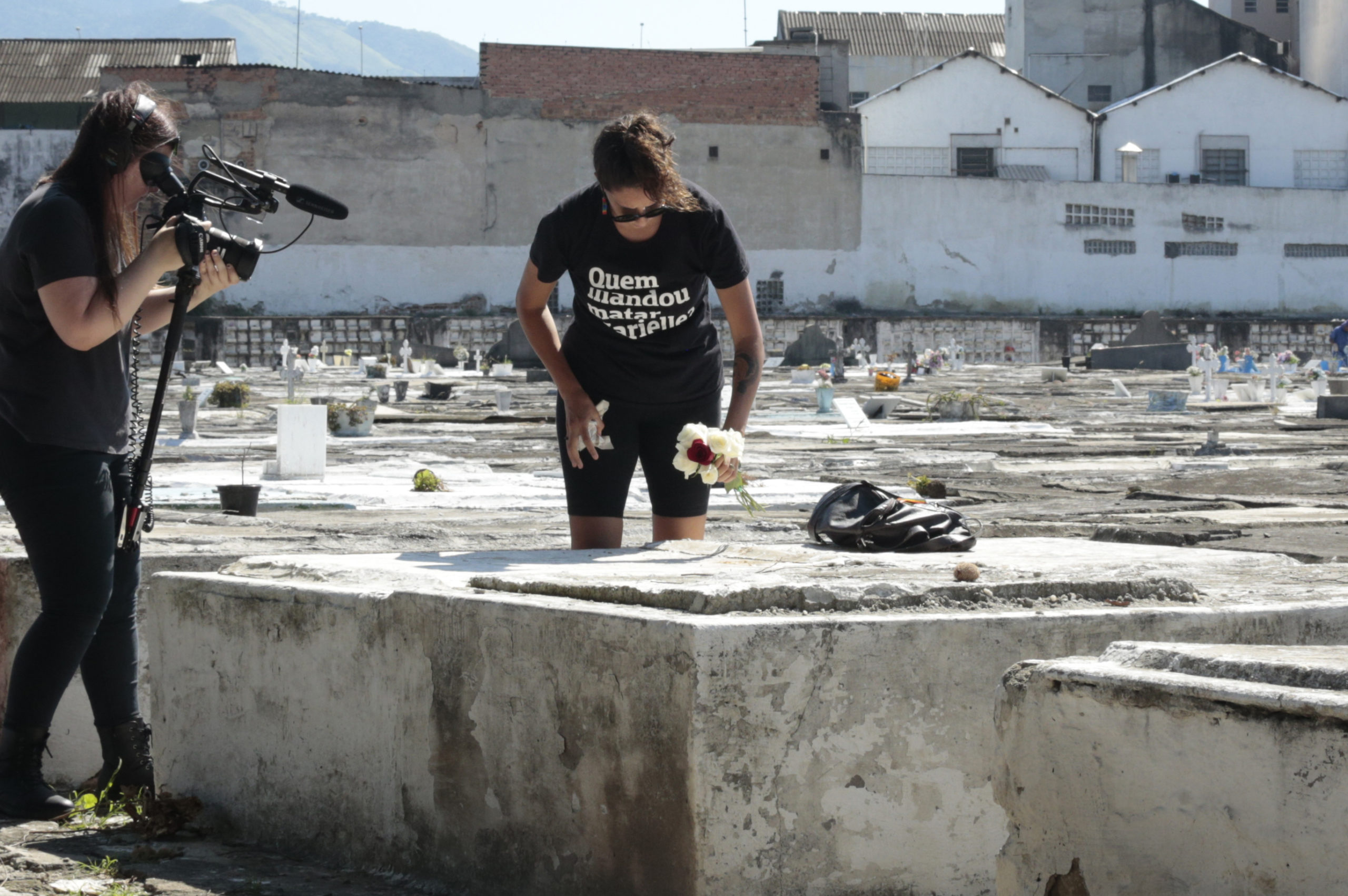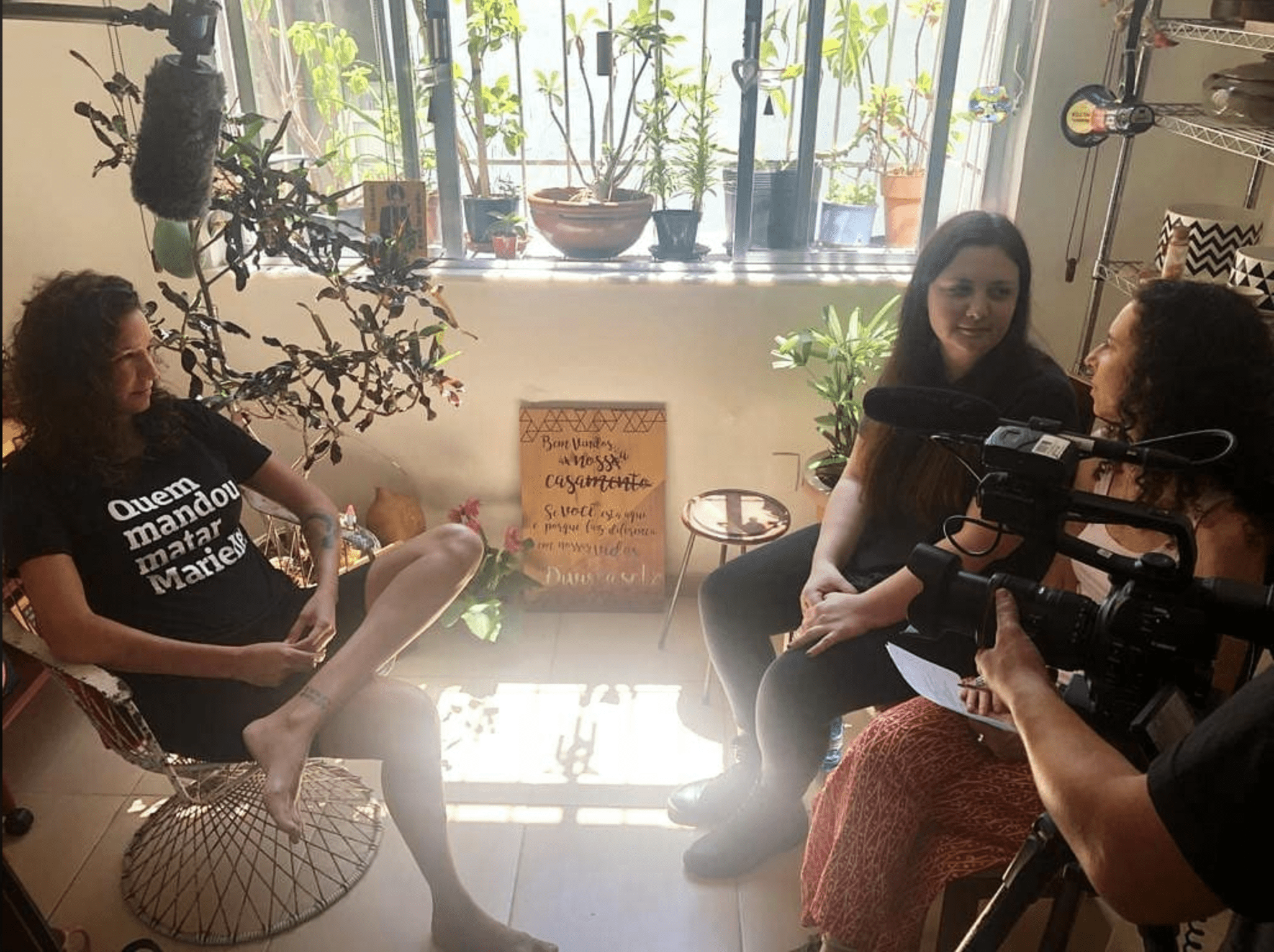
Orion Rose Kelly and Pedro Cota
Orion Rose Kelly and Pedro Cota’s (’20) thesis documentary ‘Na Luta Delas’ (In Their Fight)—about growing violence against the LGBTQ+ community in Brazil— has been named one of seven finalists in the 47th Student Academy Awards.
Orion Rose Kelly started investigating the murders of trans women five years ago while conducting research for an art installation she was producing about the growing number of transgender murders in the United States. She was stunned to learn that over 300 LGBTQ+ people are brutally murdered in Brazil each year, and nearly 180 of those murders are trans women. That’s six to seven times the number of trans women reportedly killed in the US each year.
“It struck a very deep chord in me, as I have lost friends to hate-violence in the past,” said Kelly. “I came to the J-School knowing I would pitch this as my thesis film, and when Pedro came on board I knew we’d make a great team. Unfortunately, as we were leaving for Brazil, one of our subjects was murdered and we had to pivot quickly. It was devastating and heartbreaking, but we knew it was even more reason to keep pushing forward and get this story out there.”
Finding characters and gaining the community’s trust would require a sensitive approach. Kelly says when they arrived she learned of a woman collecting data on trans murders who happened to be the first openly trans Navy member in Brazil. “Pedro and I worked sleepless nights with our field producer to get a hold of Bruna, and once we had her on board, we knew this film would be special. I think we were able to gain the access we did because it was clear that our purpose for this film was to offer up a platform for these women to be heard.”
“At Berkeley Journalism, we believe deeply in shedding light on the plight of people historically disenfranchised, and we could not be more proud of Orion and Pedro for their courageous and important work,” said Geeta Anand, interim dean. “Our community is celebrating today the fact that these two extraordinary young filmmakers are being recognized for their excellent work and commitment to telling stories that bring grave injustices to public attention.”

Orion Rose Kelly films Monica Benicio as she visits the grave of her late wife Marielle Franco, on Tuesday, Jan. 7th, 2020, in Rio de Janeiro, Brazil.
“With a humanizing lens, Orion and Pedro’s film beautifully captures the stories of the LGBTQ+ community fighting for their lives in Brazil,” said Cassandra Herrman, who directed the doc program from 2019-2020 and Kelly Whalen, who helped shepherd the film in the spring semester. “Facing a number of obstacles, including having to make a major production change overseas, the filmmakers persevered. With intimate camerawork and sensitive storytelling, the film bears witness to the LGBTQ+ community’s resilience in the face of violence, particularly against trans women of color. Orion and Pedro’s filmmaking sensibility promises that we will see more stories from them that move us, provoke us and that we can’t look away from.”
Through a lens of experience
“There aren’t many stories that come out of Latin America, and the ones that do are mostly limited to immigration and organized crime,” Pedro Cota said. “I felt it was very important to introduce a different conversation about Latin America to an American audience. Having witnessed machismo and this type of violent culture in Mexico definitely informed the way I approached the subject. I’m hoping the Mexican audience will be able to relate to the film and think about its own issues of violence against its own LGBTQ+ community.”

Pedro Cota films Monica Benicio (left) during sit-down interview with Orion Rose Kelly about the murder of her late wife, Congresswomen Marielle Franco, on Tuesday, Jan. 7th, 2020, in Rio de Janeiro, Brazil.
Kelly says starting out as a queer visual journalist, it was difficult acclimating to an oftentimes sexist and homophobic work environment. “I would have my editor tell me that I couldn’t report on stories related to the LGBTQ+ community, because I was too close to the subject matter. It took me a long time to unlearn their notions of objectivity, and push past their old-fashioned newsroom etiquette.”
Furthermore, Kelly says, it’s vital for the LGBTQ+ community to not only be seen, but to have their stories be told through the lens of someone who understands their struggles on a relatable level. “I found it very important that our film gave agency to the women we were documenting, and offered an authentic gaze into queer culture.”
How they found out
The pair found out they were nominated from Eva Rendle, another Student Academy Award-winning alum from the doc program, said Cota. “She texted me and Orion “I just saw the SAA announcement! Congratulations!!!” It was super cool. I told my partner right away, then I called my parents in Mexico. They were all very happy.”
“Learning we’d been nominated for a student Oscar was validating, I couldn’t stop smiling,” says Kelly. “I felt pride. Then, I remembered the sister we lost before our journey, and the 14 trans lives that were taken during our production days and I thought, ‘this is why I do this!’ The emotional labor was well worth it because we need to continue documenting stories that tend to get unseen in mainstream media. The Academy acknowledging our film is a way of telling the LGBTQ+ community that their lives matter, and that marginalized filmmakers matter. It’s something I will cherish forever.”
Gratitude
The pair say they have “a ton of people” to thank for making this film possible, but especially Cassandra Herrman and Kelly Whalen. “They supported Orion and I every step of the way and never gave up on us,” Cota said. “Their encouragement and support really helped us push this film across the finish line, especially when completing the film during a worldwide pandemic. We’re also super grateful to the IRP and Prof. David Barstow for financially supporting our film, and our fellow alumna field producer Daniela Broitman (‘00), Mike Shen, Chris O’Dea, student tutors, staff, colleagues and alumni,” said Cota.
This year’s Oscar nomination follows a four-year run of success for Berkeley student filmmakers. Last year, Eva Rendle’s thesis film “All That Remains” won a bronze medal. The prior year, the thesis films of four graduates—Grace Oyenubi, Lauren Schwartzman, Alan Toth and Nani Sahra Walker—accounted for three of seven finalist spots in the documentary category, a historical record for Berkeley Journalism. Schwartzman took home the bronze medal.
The year before, grads Brad Bailey (’17) and Jason Hanasik (’17) were named finalists for Bailey’s “Hale” and Hanasik’s “How to Make a Pearl.” Bailey went on to win the gold for documentary. In 2016, producers Melina Tupa (’16) and Daphne Matziaraki (’16) were both nominated. Matziaraki took home the top prize.
The 47th Student Academy Awards will be presented on Oct. 15. The medal placements–gold, silver and bronze–will be announced during the ceremony. All Student Academy Award-winning films automatically compete for Oscars in the Documentary Short Subject category.
